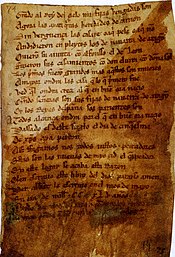Chilote Spanish: Difference between revisions
m not a subvariety of Chilean Spanish, different origin and key features |
m deleting speakers (not all inhabitants of Chiloe Archipelago and not only there), year of battle of Curalaba |
||
| Line 4: | Line 4: | ||
|pronunciation = {{IPA-es|espaˈɲol tʃiˈlote|}} |
|pronunciation = {{IPA-es|espaˈɲol tʃiˈlote|}} |
||
|states = [[Chiloé Archipelago]], [[Chile]] and vicinity. |
|states = [[Chiloé Archipelago]], [[Chile]] and vicinity. |
||
|speakers = |
|speakers = |
||
|date = |
|date = |
||
|ref = |
|ref = |
||
|script = [[Latin script|Latin]] ([[Spanish alphabet]]) |
|script = [[Latin script|Latin]] ([[Spanish alphabet]]) |
||
|familycolor = Indo-European |
|familycolor = Indo-European |
||
| Line 24: | Line 24: | ||
'''Chilote''' is a [[dialect]] of [[Spanish language]] spoken on the southern Chilean islands of [[Chiloé Archipelago]] (Spanish: ''Archipiélago de Chiloé'' or simply, ''Chiloé''). It has distinct differences from standard [[Chilean Spanish]] in accent, pronunciation, grammar and vocabulary, especially by influences from local dialect of [[Mapuche language]] (called ''huilliche'' or ''veliche'') and some [[conservative (language)|conservative traits]]. |
'''Chilote''' is a [[dialect]] of [[Spanish language]] spoken on the southern Chilean islands of [[Chiloé Archipelago]] (Spanish: ''Archipiélago de Chiloé'' or simply, ''Chiloé''). It has distinct differences from standard [[Chilean Spanish]] in accent, pronunciation, grammar and vocabulary, especially by influences from local dialect of [[Mapuche language]] (called ''huilliche'' or ''veliche'') and some [[conservative (language)|conservative traits]]. |
||
After the [[battle of Curalaba]] and the [[Destruction of the Seven Cities]] Chiloé was further isolated from the rest of [[Chile]] and developed a culture with little influences from Spain or mainland Chile. During the 17th and 18th century most of the archipelagoes population was [[bilingual]] and according to [[John Byron]] many Spaniards preferred to use the Indian language by considering it more beautiful.<ref>Byron, John. El naufragio de la fragata "Wager". 1955. Santiago: Zig-zag.</ref> Around the same time, governor [[Narciso de Santa María]] complained that Spanish settlers in the islands could not speak Spanish properly but did well on veliche and that this second language was more used.<ref>Cárdenas, Renato; Montiel, Dante y Hall, Catherine. Los chono y los veliche de Chiloé. 1991 Santiago: Olimpho. p. 277 p</ref> |
After the [[battle of Curalaba]] (1598) and the [[Destruction of the Seven Cities]] Chiloé was further isolated from the rest of [[Chile]] and developed a culture with little influences from Spain or mainland Chile. During the 17th and 18th century most of the archipelagoes population was [[bilingual]] and according to [[John Byron]] many Spaniards preferred to use the Indian language by considering it more beautiful.<ref>Byron, John. El naufragio de la fragata "Wager". 1955. Santiago: Zig-zag.</ref> Around the same time, governor [[Narciso de Santa María]] complained that Spanish settlers in the islands could not speak Spanish properly but did well on veliche and that this second language was more used.<ref>Cárdenas, Renato; Montiel, Dante y Hall, Catherine. Los chono y los veliche de Chiloé. 1991 Santiago: Olimpho. p. 277 p</ref> |
||
==References== |
==References== |
||
Revision as of 17:25, 2 May 2018
| Chilote Spanish | |
|---|---|
| Español Chilote | |
| Pronunciation | [espaˈɲol tʃiˈlote] |
| Native to | Chiloé Archipelago, Chile and vicinity. |
| Latin (Spanish alphabet) | |
| Language codes | |
| ISO 639-3 | – |
| Glottolog | None |
Chilote is a dialect of Spanish language spoken on the southern Chilean islands of Chiloé Archipelago (Spanish: Archipiélago de Chiloé or simply, Chiloé). It has distinct differences from standard Chilean Spanish in accent, pronunciation, grammar and vocabulary, especially by influences from local dialect of Mapuche language (called huilliche or veliche) and some conservative traits.
After the battle of Curalaba (1598) and the Destruction of the Seven Cities Chiloé was further isolated from the rest of Chile and developed a culture with little influences from Spain or mainland Chile. During the 17th and 18th century most of the archipelagoes population was bilingual and according to John Byron many Spaniards preferred to use the Indian language by considering it more beautiful.[1] Around the same time, governor Narciso de Santa María complained that Spanish settlers in the islands could not speak Spanish properly but did well on veliche and that this second language was more used.[2]

